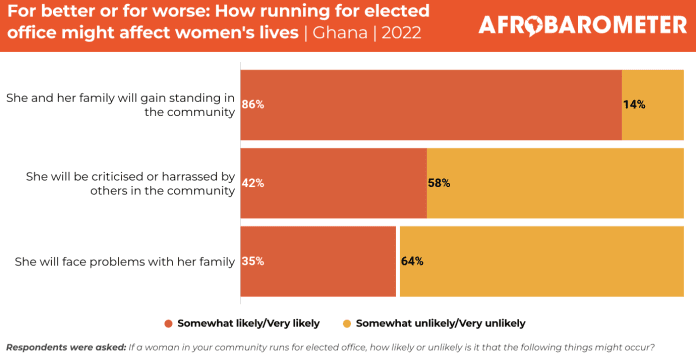Ghanaians give negative ratings on gov’t efforts to close Gender inequality gaps
Women still trail men when it comes to educational attainment and control over how household monies are spent, survey findings show. Ghanaians voice strong support for women to have the same rights as men in land ownership and inheritance.
Amid persistent gender inequalities, Ghanaians give negative ratings on government efforts to close gaps Gender inequalities persist in Ghana, and citizens expect greater government efforts to erase them, the latest Afrobarometer survey shows.
Women still trail men when it comes to educational attainment and control over how household monies are spent, survey findings show. Ghanaians voice strong support for women to have the same rights as men in land ownership and inheritance.
In the political sphere, a majority believe that a woman who runs for political office will gain standing in the community, but many also say it is likely that she will be criticized or harassed.
Overall, a majority of citizens give the government a failing grade for its efforts to promote equal rights and opportunities for women.
Key findings
▪ Women are less likely than men to have secondary education (37% vs. 45%) or postsecondary education (13% vs. 24%) and more likely than men to have no formal
schooling (20% vs. 11%) or only primary education (30% vs. 20%)
▪ Half (51%) of Ghanaian women say they make household financial decisions
independently, compared to 60% of men (Figure 2).
▪ Most Ghanaians (85%) say women should have the same right as men to own and inherit land. Men are less inclined than women to believe in equality when it comes to land (82% vs. 89%) .
▪ More than eight in 10 citizens (86%) think a woman will gain standing in the community if she runs for elective office. But 42% also say it’s likely she will be criticised or harassed, and 35% think she will probably face problems with her family.
▪ A majority (55%) of Ghanaians say the government is doing “fairly badly” or “very badly” at promoting equal rights and opportunities for women.
Afrobarometer surveys
Afrobarometer is a pan-African, non-partisan survey research network that provides reliable data on African experiences and evaluations of democracy, governance, and quality of life. Eight survey rounds in up to 39 countries have been completed since 1999. Round 9 surveys (2021/2022) are currently underway. Afrobarometer’s national partners conduct face-toface interviews in the language of the respondent’s choice.
The Afrobarometer team in Ghana, led by the Ghana Center for Democratic Development, interviewed a nationally representative sample of 2,400 adult Ghanaians in April 2022. A sample of this size yields country-level results with a margin of error of +/-2 percentage points.
Source: newsghana.com.gh


